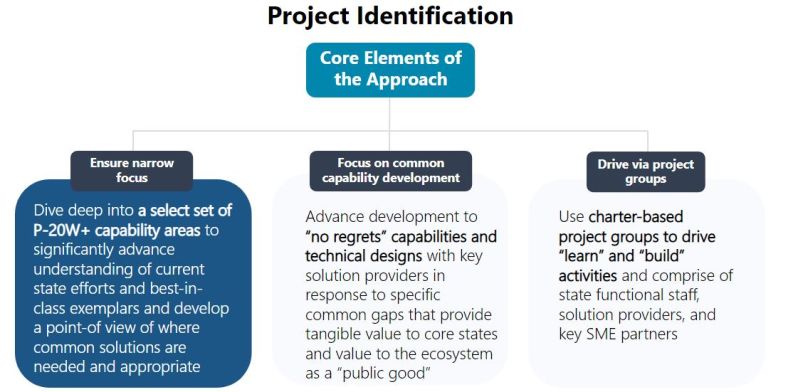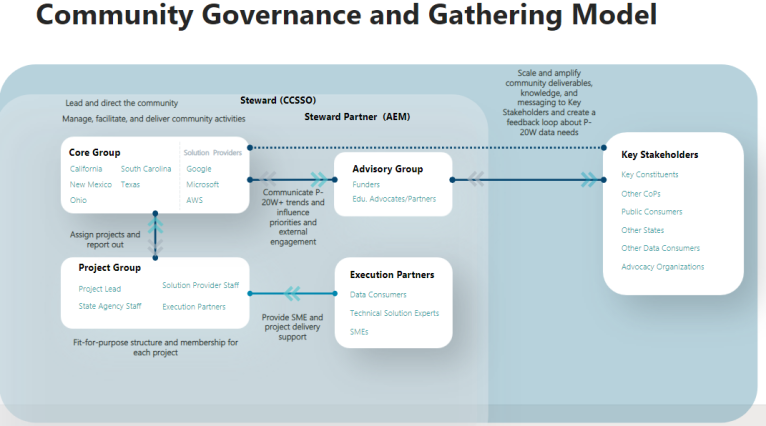About Us
The P-20W+ Community of Innovation (COI) Overview
The Community's goal is to accelerate the progress states are making to modernize their systems that securely manage data, from preschool through K-12, and into college and/or the workforce.
Effective state data systems can present a fuller picture of student and worker experiences and outcomes, giving state leaders solid data to inform decisions for improvement.
The COI unifies voices, state and solution provider alike, from across the P-20W+ landscape to complement existing efforts in this ecosystem as well as break new ground.
By gathering together, we believe we can begin to achieve scale.
History
The P-20W+ Community of Innovation (COI) was born from a recognition that while there are many communities of practice within the varied stages of early childhood, K-12, Postsecondary, and Workforce data efforts, there wasn't a single, gathering point for thinkers working across these arenas.
Our Community brings those people together to accelerate progress in the modernization efforts uniquely required of the P-20W+ space.
By forging groundbreaking partnerships among state agencies, technology industry partners, and data advocates, our mission is to accelerate the modernization process for state data systems spanning preschool through K-12, and on into college and or the workforce.
This unique community, co-stewarded by the Council of Chief State School Officers (CCSSO) and Applied Engineering Management Corporation (AEM), is developing and curating supportive toolsets, technical assets, and guides designed to enable scale, align the market, and share innovation experiences for the benefit of all state organizations across the P-20W+ landscape.
Mission, Vision, and Purpose
The P-20W+ Community of Innovation’s (COI) mission, vision, and three-fold purpose are:
Mission: To Enable cost-effective, efficient, and accessible P-20W+ systems to derive actionable data insights to reduce time to value, lower risk and cost for P-20W+ modernization efforts.
Vision: Leverage deep experience from states and expertise from solution providers to develop capabilities, artifacts, and products around common P-20W+ use cases to support modern P-20W+ data pipelines.
Purpose:
- Accelerate progress of core states’ modernization efforts.
- Align the market around common language, methodologies, and technical approaches to enable innovation and scale for states.
- Structure and document the modernization experience to inspire and enable other states to be “fast followers.”
Approach
The P-20W+ Community of Innovation (COI) connects leaders across the data and technical space in order to plan, guide, and deliver high-impact supports that reflect a broad range of insights and experience. The COI follows proven practices. Our model is to work intensively with a few core states, move as quickly as possible, and share the resulting resources and experiences via our website, the Data Accelerator, for the benefit of all.
To do this, we convene a group of experts from state agencies, technology companies, education advocates, and others in the Community who are interested in a given project, we scope the work together, and then execute as a team.
The COI's work is comprised of a series of projects, such as developing a scan of best-in-class approaches to streamlining P-20W+ data access and creating playbooks to inform state efforts to establish a new P-20W+ data governance approach for faster and more efficient data access.
Some examples of recent project outputs are included below:
Governance and Gathering Model
The P-20W+ Community of Innovation (COI) follows a collaborative stewardship model.
Steward Partners
The Co-Steward Partners are currently (2023) representatives from the Council of Chief State School Officers (CCSSO) and AEM Corporation.
Steward Partner Responsibilities
As steward partners, CCSSO leads and directs the community, while AEM manages, facilitates, and delivers the COI's activities.
Governance
- Define vision / strategy in conjunction with the Core Group and Advisory Board
- Lead engagement with Core Group to refresh annual priorities and identify key projects
- Manage community membership (including Core Group, Funders, and Advocates)
- Manage operating model function and improvements in conjunction with the Core Group
Project Work
- Define and launch projects (including project milestones, budgets, and staffing)
- Lead, manage, and participate in project work, including deliverable production, refinement, and scaling
- Maintain knowledge platform and internal community member communication
External Engagements
- Plan and facilitate annual convening
- Define and execute messaging and funding strategy with Advisory Group
- Engagement Advocacy Board to define and execute external engagement and advocacy plan
- Manage and distribute regular communications with Key Stakeholders
Core Group
The Core Group, currently (2023) includes representatives from the following organizations:
- Amazon Web Services
- California Cradle-to-Career
- Innovate Ohio
- Microsoft
- New Mexico Department of Education
- New Mexico Higher Education Department
- Ohio Department of Administrative Services
- South Carolina Department of Education
- Texas Higher Education Coordinating Board
- Texas Workforce Commission
Core Group Responsibilities
Governance
- Define priorities, activities, and vision of community and discuss with Advisory Group as needed
- Make strategic community decisions (e.g., when to involve new members) in service of expanding community knowledge
- Contribute, review, and implement community feedback to identify operating model changes
Project Work
- Define outcomes for projects that will meaningfully impact P-20W+ data
- Provide execute leadership and point of view to refine capabilities
- Review project progress and deliverables to ensure maximum P-20W+ impact and applicability at a State level
- Review and refine artifacts developed by project teams prior to sharing with community members
External Engagements
- Promote community and artifacts produced in alignment with distribution and scaling plan created by Stewards and Advisory Board
- Implement community deliverables, provide feedback and refine to alleviate capacity constraints and demonstrate community value
- Attend annual convening to promote community successes
Advisory Group
The Advisory Group, currently (2023) includes representatives from the following organizations:
- Bill & Melinda Gates Foundation
- Data Quality Campaign
- Early Childhood Data Collaborative
- Education Commission of the States
- Michael & Susan Dell Foundation
- National Association of State Workforce Agencies
- National Center for Education Statistics
- National Public Education Support Fund
- Schmidt Futures
- State Higher Education Executive Officers Association
- Walton Education Coalition
- Walton Family Foundation
- WestEd
Advisory Group Responsibilities
Governance
- Attend Advisory Group meetings to develop community strategy
- Provide thoughtful feedback to the Stewards and Core Group from constituents on P-20W+ needs, quality and use of community deliverables, and opportunity areas for capability development
Funding
- Help the Stewards and Core Group define an engagement and messaging strategy with the P-20W+ funder ecosystem across federal, state, and philanthropic sources
- Draw connections between project opportunities and potential funders
Project Work
- Receive and review outcomes of project work; provide feedback for operational and artifact improvements based on knowledge of the P-20W+ domain and constituents
- Represent P-20W+ consumer needs, if relevant, in project work
External Engagements
- Attend annual convening to support expanding community impact
- Support development of distribution and scaling plans for community knowledge base with Stewards
- Scale distribution of community artifacts and amplify messaging by communicating to respective constituents, sharing community successes, and actively seeking feedback from constituents to improve technical artifacts in service a self-sustaining community
Project Group
Project Groups are formed to support the various projects the COI undertakes and are made up of COI members with interest and expertise in the project areas at hand. Their membership varies from project to project.
Project Group Responsibilities
Project Work
- Execute project charter as prescribed by the Core Group
- Craft deliverables tested for quality and feasibility for implementation from a usability and investment and return perspective in conjunction with Steward Partner
- Solicit feedback on artifacts developed and potential areas for improvement and incorporate feedback to ensure deliverables are maximally useful to all states outside of Project Group meetings
External Engagements
- Attend annual convening
- Use community learnings to interpedently develop products, communications, or initiatives that progress the community’s capability development or P-20W+ data engagement as a whole
Execution Partners
Execution Partner Responsibilities
Project Work
- Provide subject matter expertise to community efforts to help define, refine, and innovate capability development.
- Contribute relevant resources to crafting / delivering Project Group deliverables
External Engagements
- Attend annual convening
- Use community learnings to interpedently develop products, communications, or initiatives that progress the community’s capability development or P-20W+ data engagement as a whole
Key Stakeholders
The Key Stakeholders Group, currently (2023) includes representatives from the following organizations:
- 1edtech
- A4L
- Amazon Web Services
- Applied Engineering Management Corporation
- Bill & Melinda Gates Foundation
- California Cradle-to-Career
- Council of Chief State School Officers
- Credential Engine
- Data Quality Campaign
- Double Line Partners
- Early Childhood Data Collaborative
- Ed Analytics
- Ed-Fi
- Education Commission of the States
- Innovate Ohio
- Michael & Susan Dell Foundation
- Microsoft
- National Association of State Workforce Agencies
- National Center for Education Statistics
- New Mexico Higher Education Department
- NPESF
- PESC
- Schmidt Futures
- South Carolina Department of Education
- State Higher Education Executive Officers Association
- Student 1
- Texas Higher Education Coordinating Board
- Texas Workforce Commission
- Walton Education Coalition
- Walton Family Foundation
- WestEd
Key Stakeholder Responsibilities
Key Stakeholders advise the Core Group about data and technical infrastructure needs in the P-20W+ arena. They help inform the Core Group about where to focus its creative and problem solving energy. They are kept abreast of COI work and are invited to be reviewers or testers of COI products before those products are released to the public domain.
Project Work
- Provide subject matter expertise to community efforts to help define, refine, and innovate capability development.
- Contribute relevant resources to crafting / delivering Project Group deliverables
External Engagements
- Attend annual convening
- Use community learnings to interpedently develop products, communications, or initiatives that progress the community’s capability development or P-20W+ data engagement as a whole
Resources
Learn more about the P-20W+ Community of Innovation (COI), explore the resources they build and curate, and connect with them through the Data Accelerator.

